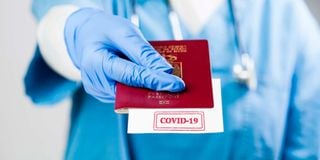Vaccine passports soon a universal travel requirement

For a while now, different countries and regions require travellers to carry Covid-19 certificates or passports, but now the document is becoming a universal requirement.
Although many countries have eased their entry requirements for international travellers, some still require coronavirus tests and proof of vaccination before allowing entry or rendering services. For some, the evidence must be more than just a piece of paper. A paper-based or digital vaccine passport is required.
The vaccine passport comes in various forms – physical certificates, ital forms and QR codes within apps. A digital health passport or vaccine passport displays a scannable code, similar to an airline boarding pass.
In essence, these documents are intended to demonstrate an individual's vaccination status. Put simply, it's a document that includes personal details, health records and information about one’s Covid-19 vaccinations.
Until Covid-19 entered our country, the word "vaccine card" for travellers conjured images of Yellow Fever vaccination cards, which have been a requirement for entry in many countries.
It is generally assumed that vaccinated individuals are less likely to transmit SARS-CoV-2, the virus that causes Covid-19, and less likely to be hospitalised or die from Covid if infected, thus making vaccine passports relatively safer for travel.
Until now, different countries and regions required travellers to carry Covid-19 certificates or passports, but now the document is becoming a universal requirement.
At the G20 Summit last week, G20 leaders agreed to adopt vaccine passports to make international travel more convenient. A G20 meeting brings together governments and leaders from 20 of the world's largest economies.
Vaccine passports are currently the subject of active international debate about how to validate their authenticity.
During the G20 summit, leaders acknowledged the importance of shared technical standards and verification methods. Dark web fake vaccine certificates are already common, so countries must work together to combat these illicit schemes.
Vaccine passports
The vaccine passports have eased travel between countries, but they have also raised scientific, ethical and legal concerns. While vaccines may reduce the risk of serious illness, they don't completely stop the spread of diseases. Critics question why a passport should be enforced because vaccines may reduce disease risk but are not 100 per cent effective.
Last year, the World Health Organization published a guidebook on the implementation of digital documentation of Covid-19 certificates. However, it warned that "passes based solely on vaccination status may increase the risk of disease spread".
Some people think enforcing vaccine passports might not be ethically acceptable if it violates certain individual freedoms for the sake of certain public goods. They argue that some people might feel forced to get vaccinated to avoid the onerous alternative of regular medical tests or, worse, reduced freedoms.
Although many of the initial mandates have been lifted, vaccine requirements had caused controversy in some countries, mainly when "no jab, no job" policies were introduced in some workplaces.
Following the G20 leaders' decision to roll out vaccination passports, the rest of the world has little choice but to follow suit.
Mr Wambugu is an informatician. Email: [email protected]. Twitter: @Samwambugu2





